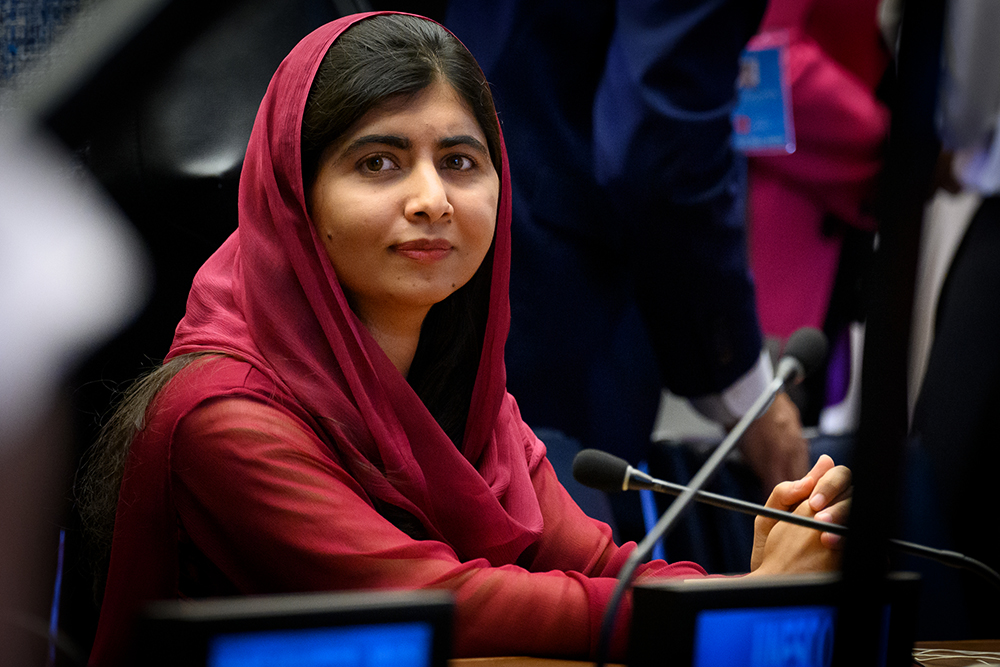Malala in Islamabad slams 'gender apartheid’ by Afghan Taliban
Nobel Peace Prize laureate Malala Yousafzai spoke out against Afghanistan's treatment of women at the International Conference on Girls’ Education in Muslim Communities hosted by Pakistan. At the end of the meeting, a 17-point declaration was signed in defence of women's education.
Islamabad (AsiaNews/Agencies) – Malala Yousafzai has urged the leaders of Muslim-majority countries to strip the Taliban regime in Afghanistan of any legitimacy and counter its repressive policies imposed on women and girls.
Speaking at the International Conference on the Education of Girls in Muslim Communities hosted yesterday by Pakistan, the Nobel Peace Prize laureate said that there is "nothing Islamic” in the Taliban’s ban on education.
Malala, who is now 27 years old, was the victim of an attack by the Pakistani Taliban in 2012, who targeted her for her speeches in favour of girls' education. Since then she has lived in the United Kingdom and has returned to her home country a few times.
In yesterday's conference, sponsored by the Organisation of Islamic Cooperation (OIC), the Pakistani government and the Muslim World League, Malala reiterated that the Taliban regime created "a system of gender apartheid” in which they punish “women and girls who dare to break their obscure laws by beating them up, detaining them and harming them.”
The Taleban “cloak their crimes in cultural and religious justification" but actually "go against everything our faith stands for".
Since the Taliban regained control of Afghanistan in August 2021, Pakistani Taleban, who are separate but share the ideology as their Afghan "cousins", have multiplied their attacks and violent actions in the country with the aim of establishing an emirate as well.
For Malala Yousafzai, in Afghanistan, the Taliban did not follow through with their initial statements to allow girls to go to school after Islamising the curriculum.
On the contrary, last month women were banned from training in the health professions (the only avenue left for young women who wanted to pursue a university education); their goal is to “eliminate women and girls from every aspect of public life and erase them from society,” the Nobel laureate said.
In her address, Malala also noted that even in Pakistan 12.5 million girls do not go to school. “[T]here is still a tremendous amount of work that is ahead of us so that every Pakistani girl can have access to her education,” she added.
The young woman also spoke out against Israeli atrocities in Gaza. “Israel has decimated the entire education system. They have bombed all universities, destroyed 90 per cent of schools and indiscriminately attacked civilians sheltering in school buildings.”
The conference ended with a 17-point "Islamabad Declaration" in which girls' education is considered not only a "religious obligation", but also a social need.
“It is a fundamental right safeguarded by divine laws, mandated by Islamic teachings, reinforced by international charters, and well-established by national constitutions,” the declaration reads. Bans on girls’ education “represent a grave misuse of religious principles to legitimise policies of deprivation and exclusion,” it added.
In fact, the declaration clearly states that anyone who rejects or opposes Islamic religious principles on education must be rejected. “It is essential to disavow their ideology, whether they are an individual, an institution, or an entity—public or private.”
What is more, “It is time to end the misrepresentation of Islam and the violation of women's rights.” To this end, the declaration’s message must to be spread through religious lessons in madrasas and Friday sermons.
16/07/2021 14:20







.png)










